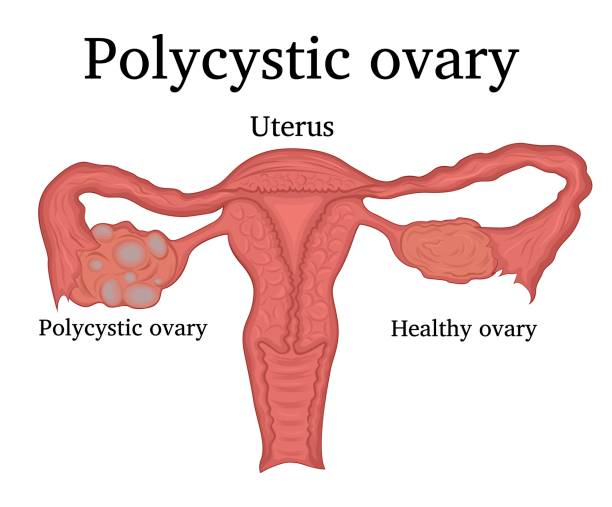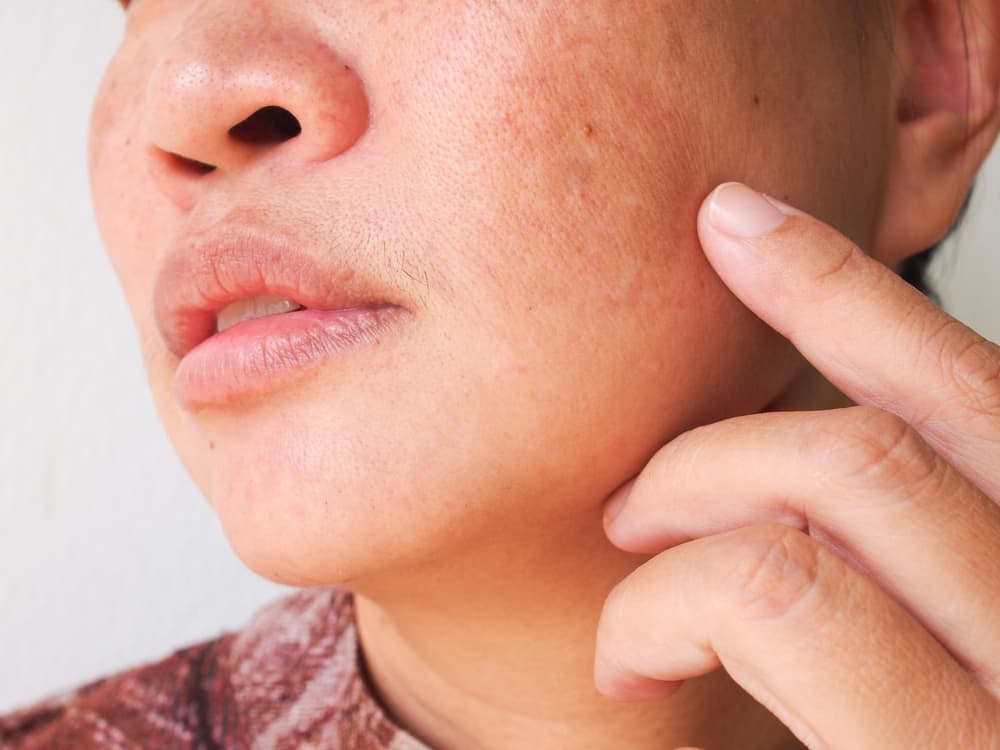
Table of Contents
What is PCOS: Unveiling the Mystery
Polycystic Ovarian Syndrome (PCOS) has puzzled science for many years. It’s a hormonal disorder that affects women of reproductive age. Estimates suggest that 1 in 10 women of childbearing age (18-45) have PCOS, which is why it’s important to understand the condition.
PCOS causes multiple cysts to grow on the ovaries, leading to a plethora of health problems that can disrupt a woman's daily life. Understanding its symptoms, diagnosing it and finding the right treatment can be complex, but shedding light on this issue can be helpful for those affected by this condition.
Not only can it cause serious physical and emotional symptoms, but it can also affect fertility and increase a person’s risk of developing other medical conditions if left untreated.
In this guide, we’ll explore the various signs and symptoms of PCOS, how to get a diagnosis, and the medical and natural treatments available for managing the disorder.

Signs and Symptoms of Polycystic Ovarian Syndrome (PCOS)
Polycystic ovarian syndrome (PCOS) is an endocrine disorder associated with a wide range of signs and symptoms. If you suspect you may have PCOS, it's important to speak to your doctor about getting a proper diagnosis. No two cases of PCOS are the same, with symptoms varying widely from one person to another. However, a few common signs can act as red flags, guiding towards the need for a thorough medical check-up.
Common signs and symptoms of PCOS include:
- Irregular or infrequent menstrual cycles
- Excess/ unwanted facial or body hair (hirsutism)
- Persistent Acne
- Weight gain
- Thinning or balding of scalp hair
- Deepening of the voice
- Stronger-than-normal body odor
- Fertility issues including abnormal enlargement of the ovaries with multiple cysts
- High levels of male hormones (e.g., testosterone)
These symptoms are often present for a long period of time before PCOS is diagnosed, usually because other conditions are ruled out first. In addition, PCOS can be complicated to diagnose as the associated symptoms can vary from case to case.
Diagnosing PCOS
There isn't a specific test for PCOS, which makes diagnosing potentially tricky. Doctors typically rely on exclusion diagnosing; ruling out other potential causes of the patient's symptoms. Current guidelines state that at least two of the following three symptoms must be present: Irregular or absent periods, elevated levels of male hormones (as evidenced by physical symptoms such as excess hair growth), and multiple cysts on one or both of the ovaries.
Dr. Louise Chang, an endocrinologist, elaborates, “The silent nature of PCOS often leads to a delay in diagnosis. Many women struggle with the symptoms for years before receiving a correct diagnosis.”
If you suspect that you may have PCOS, it is important to speak with a doctor about your symptoms and concerns. A doctor will be able to make an accurate diagnosis of PCOS based on medical tests and self-reported symptoms. To diagnose PCOS, a doctor will typically do the following:
- Conduct a physical exam and measurement of your weight and body mass index (BMI).
- Order blood tests to measure levels of reproductive hormones. This includes looking at levels of luteinizing hormone (LH) and follicle stimulating hormone (FSH).
- Order an ultrasound to look for cysts in your ovaries.
- Ask questions about your health history and any other possible symptoms related to PCOS.
After reviewing all the information, a doctor will be able to diagnose PCOS and suggest the best treatment options for you. It is important to remember that if you are diagnosed with PCOS, know that you are not alone. There are many resources available to help you manage the condition and its side effects.
Link between PCOS and Infertility
Polycystic Ovarian Syndrome (PCOS) is a common hormone disorder causing infertility in women. PCOS is caused by changes in the levels of hormones in the body, resulting in an imbalance of female reproductive hormones. It can affect how a woman’s ovaries work, leading to fertility issues.
Women with PCOS are more likely to have irregular periods or no periods at all, which makes it very difficult for them to become pregnant naturally. Other factors that contribute to infertility include elevated levels of male hormones, such as testosterone; obesity; and metabolic syndrome. All of these factors can make it difficult for a woman to ovulate and conceive.
There are some steps women can take to reduce their risk of infertility. Firstly, managing their weight is key. Maintaining a healthy weight is important for regular ovulation and conception. Secondly, taking medications that regulate hormones can help. Thirdly, lifestyle changes such as exercising, eating a balanced diet, and reducing stress can also help.
It is important to note that these are only steps to reduce the risk of infertility, but they don’t necessarily guarantee pregnancy. Therefore, it is important for anyone who suspects they have PCOS to get professional medical advice.
Natural and Medical Treatments for PCOS
Managing PCOS symptoms is important for the overall health of those affected by the condition. PCOS is a long-term condition with no definitive cure yet, but there are many treatment strategies that can help manage the symptoms.
The goal of treatment is to find the best combination of lifestyle adjustments and medication to help the patient maintain a regular menstrual cycle, manage symptoms, and increase insulin sensitivity.
Luckily, there are both natural and medical treatments available to help people manage their PCOS.
It begins with leading a healthy lifestyle by maintaining a balanced diet and regular workouts. This not only helps in managing body weight but also increases insulin resistance and decreases heart disease risk. On top of that, medication can be used to manage symptoms such as hormonal imbalances, acne, and excessive hair growth.
Medical Treatments
A doctor may suggest a range of medications that can help reduce insulin resistance or balance hormones, depending on a person's individual symptoms and condition. Some of the commonly prescribed medications include:
- Metformin – an anti-diabetic drug used to control insulin resistance and glucose levels
- Birth control pills – used to improve hormone balance and regularize the menstrual cycle
- Clomiphene – a fertility drug used to induce ovulation in women with PCOS, so they can become pregnant
Natural Treatments
Certain dietary and lifestyle changes can also help to improve PCOS symptoms. Making dietary changes can be especially beneficial, as weight management is often linked to PCOS. Eating a balanced diet rich in fiber and low in carbohydrates and saturated fats can help with weight management. Regular exercise, such as walking, biking, swimming, and jogging, can also help improve insulin sensitivity and reduce symptoms.
Herbal supplements, such as chasteberry and spearmint, may also be helpful in managing PCOS symptoms. Chasteberry helps to balance hormones and reduce the severity of acne in some people with PCOS, while spearmint reduces inflammation and helps regulate the menstrual cycle.
Creating a comprehensive plan to naturally manage PCOS should be discussed with a healthcare professional, as it may involve making dietary and lifestyle changes, as well as taking herbal supplements.
Expert Perspectives: Gaining Deeper Insights
Renowned gynecologist Dr. Mark Soll, implies, “Addressing the mental health challenges that may arise due to PCOS is equally important. The diagnosis can be emotionally taxing, leading to issues such as depression or anxiety.” Indeed, patients are encouraged to seek counseling or join support groups as part of their treatment plan.
Understanding Genetics: Unraveling the Family Ties
Interesting revelations have seen genetics playing a significant role in the development of PCOS. Studies are ongoing to explore the genetic variants that may predispose a woman to develop this syndrome. However, having a family member with PCOS increases your risk, underlining the importance of understanding one's family medical history.
Explore the Role of Diet: Eating Right Does Count
Research has also delved into the impact of diet on PCOS. High-protein, low-carbohydrate diets have shown promise in improving hormonal balances in women with PCOS. Ditching processed food and switching to wholegrain variants, lean protein, and fresh vegetables helps to better manage the symptoms. Additionally, drinking plenty of fluids, especially water, is essential.
Complementary Therapies: Looking Beyond Conventional Medicine
An emerging area of interest in the management of PCOS is the use of complementary therapies. Yoga, acupuncture, and herbal medicines are some of the methods being explored. While they cannot replace conventional treatment, these approaches have shown promise as part of comprehensive treatment plans, offering physical, emotional and psychological relief.
The Future of PCOS: A Ray of Hope
While it can be overwhelming to navigate life with PCOS, there is hope on the horizon. Clinical trials are underway in various parts of the world, looking at new therapies and approaches to manage the syndrome. The healthcare community is taking this issue seriously, which is a positive step towards finding a definitive cure for PCOS. By spreading awareness about the condition, more women can seek help earlier, reducing the long-term impact on their bodies and lives.
Understanding PCOS: Conclusions and Tips
PCOS is a complex disorder that affects many women, and understanding the condition is an important step to managing it. Women with PCOS can reduce their risks of infertility by making lifestyle changes and consulting with their physician about treatment options.
Additionally, PCOS is a manageable condition, and early diagnosis and intervention can greatly improve the quality of life for those affected. there are numerous natural and medical treatments that can help manage the symptoms of PCOS and its side effects. Also, there are a few key tips to keep in mind. It’s important to keep a healthy diet, stay active, monitor your body’s response to treatment, and seek emotional support.
Additionally, if you suspect that you have PCOS, it is important to speak to your doctor for a diagnosis and treatment plan. With the right management and support, you can lead a full and healthy life.
Remember, understanding PCOS starts with tuning into your body, noting changes that persist, and seeking expert medical advice. There’s strength in knowledge, as it is the first step in managing the condition and taking control of your health.
Frequently Asked Questions About PCOS
What is PCOS, and what are its common symptoms?
Polycystic Ovary Syndrome (PCOS) is a hormonal disorder that affects people with ovaries. Common symptoms include irregular periods, excess hair growth, acne, and ovarian cysts. Weight gain and fertility issues may also be present.
How is PCOS diagnosed?
PCOS is typically diagnosed through a combination of medical history, physical exams, blood tests, and imaging studies (like ultrasound). Doctors will also assess your symptoms, such as irregular periods and excess hair growth.
Can PCOS affect my fertility?
Yes, PCOS can impact fertility. It often leads to irregular ovulation or even the absence of ovulation, which can make it challenging to conceive. However, with proper treatment, many people with PCOS can still have successful pregnancies.
What are the treatment options for PCOS?
Treatment depends on individual goals and symptoms. Common options include lifestyle changes (diet and exercise), birth control pills (to regulate periods), and medications to manage insulin resistance. Fertility treatments may be necessary for those trying to conceive.
Is there a link between PCOS and weight gain?
Yes, there's often a connection between PCOS and weight gain, as insulin resistance can lead to weight gain and make it harder to lose weight. Managing weight through a healthy diet and exercise is an important aspect of PCOS management.
Can PCOS be cured?
PCOS is a chronic condition that can't be cured, but its symptoms can be managed effectively with the right treatments and lifestyle changes. Many people with PCOS lead healthy and fulfilling lives with proper management.
Are there natural remedies or alternative therapies for PCOS?
While lifestyle changes like diet and exercise can help manage PCOS, there is no single natural remedy that can cure it. Alternative therapies such as acupuncture or herbal supplements may provide some relief for certain symptoms but should be discussed with a healthcare provider.
Can PCOS lead to other health issues?
Yes, PCOS is associated with several potential health risks, including type 2 diabetes, heart disease, and mood disorders like depression and anxiety. Regular check-ups and appropriate treatment can help mitigate these risks.
Is PCOS more common in certain populations?
PCOS can affect people of all races and ethnicities, but it is more commonly diagnosed in people of South Asian, African, and Middle Eastern descent. Genetics and environmental factors may contribute to this variation.
How can I support a loved one with PCOS?
Supportive friends and family can help by being understanding and empathetic. Encourage your loved one to seek medical advice, join support groups, and make lifestyle changes together to promote their overall well-being.
PCOS References & Resources
If you are looking for more information on PCOS, there are a number of excellent resources available. Here are some of the best references and resources to check out:
- WebMD: WebMD is an online platform that contains information about various conditions, including PCOS. Visit https://www.webmd.com/women/what-is-pcos to learn more.
- PCOSAA: PCOS Awareness Association is an organization working to increase global awareness of Polycystic Ovarian Syndrome (PCOS) and help those diagnosed with this condition. Visit https://www.pcosaa.org/ to learn more.


